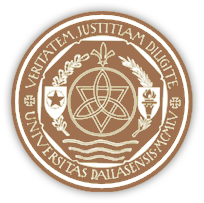Table of Contents: Volume 2, Issue 1
Volume Two
Editor-in-Chief: D. William Turnage (PhD candidate, Literature)
Managing Editor: Amos Hunt (PhD student, Philosophy)
Editors:
Peter S. Hermanson (PhD student, Philosophy)
Franz Klein (PhD student, Literature)
J. Douglas Macready (PhD student, Philosophy)
Emily Speller (PhD candidate, Literature)
Faculty Advisor
Eileen Gregory
Faculty Review Board
John Alvis (Literature), Bainard Cowan (Literature),
Jonathan Culp (Politics), Christopher Mirus (Philosophy),
John Norris (Theology), Robert Wood (Philosophy)
Ramify thanks our financial supporters:
Braniff Graduate Student Association, Mehreen Younis, President
Braniff Graduate School of Liberal Arts, David Sweet, Dean
Cover and book design: Jessica Williamson Kane.
ISSN 2158-5784
The Prologue(s) to Paradiso: Dante as Christian Poet
by Robert Hollander
Dante’s Falcons: Metaphor as Theology in the Commedia
by Tiffany Niebuhr
Abstract:
Within a single field of imagery in the Commedia, that of falconry, Dante displays the sheer diversity of his poetic powers. His four falcon similes enrich the infernal, purgatorial, and celestial atmospheres of their respective canticles, whereas his two falcon metaphors represent God’s kingliness and reveal his active, effectual love. Because similes compare accidents and metaphors substances, the selection of metaphor over simile when describing God is, for Dante, a theological statement about the ontological correspondence between God and his creation. Though rhetoricians and philosophers contest the definition of metaphor, medieval thinkers acknowledged a metaphysical relationship between the natural and the supernatural orders—a relationship that explains how one thing can signify another because it is created to do so. Dante, while certainly an inventive poet and philosopher, wrote within this medieval environment in which a poetic trope had a philosophical and theological significance. To appreciate fully Dante’s image of God as falconer, we must exercise our historical imagination; we must, like the medievals, envision a world in which the created order signifies, represents, and participates in the divine.
Wineskin or Windbag? Elihu and the Problem of Justice in the Book of Job
by Allison Postell
Abstract:
Job is one of the most perplexing books of the Bible. Among its perplexities is the presence of a character named Elihu, who intervenes to speak between the addresses of Job’s three friends and that of God himself. The nature of Elihu’s personality is difficult to discern, and the placement of his speeches makes a comprehension of the book of Job as a literary whole elusive. Close attention to the rhetorical character as well as to the content of Elihu’s speeches reveals that he penetrates more deeply than do Job’s friends into the nature of human suffering; of all Job’s interlocutors, Elihu gives the best rational explanation of the nature of divine justice and the cause of Job’s suffering. But his misinterpretations combined with his foolish confidence in his own ability to explain Job’s suffering also display the inability of human reason to comprehend divine justice, paving the way for the different and new sort of wisdom that Job attains at the end of the book.
An Art of Gathering Scattered Humanity: Ciceronian Civic Humanism and the Defense of Responsible Rhetoric in De Oratore
by Scott F. Crider
The City of God as Pariah: Peregrinic Metaphysics as a Ground for Ethics in Augustine’s De Civitate Dei Contra Paganos
by J. Douglas Macready
Abstract:
In the opening lines of De Civitate Dei contra Paganos Augustine describes the City of God as living as a peregrinus among the pagans. In fact, the essence of the work can be said to be contained in the meaning of this word. Augustine's frequent use of it suggests that peregrinus functions as a technical term in his writing and points toward a unique metaphysical understanding of human nature that serves as a foundation for his ethics. This term offers an insight into Augustine's understanding of the relationship between being-in-the-world (metaphysics) and being-with-others-in-the-world (ethics). When Augustine's description of the City of God as peregrinus is compared with Hannah Arendt's description of twentieth-century Jewish refugees as pariahs in "We Refugees" and "The Jew as Pariah: A Hidden Tradition," a more radical understanding of Augustine's ethical orientation emerges in which enemies are transformed into guests and difference is welcomed and accepted.
“Matters Hid”: Demonic Possession and Milton’s Sons of God
by Christopher D. Schmidt
Abstract:
In Genesis 6, unnamed antediluvian “sons of God” couple with “daughters of men” and beget a race of giants. Biblical commentators have always disagreed about whether these sons of God are human or demonic, and Milton amplifies this controversy in his epic poems. Two of his four allusions to Genesis 6 refrain from identifying the sons of God at all; the third identifies them as humans, the fourth as demons led by Belial. No Milton scholar has successfully reconciled the contradiction, though Milton’s interest in developing a consistent theological meaning for the title “sons of God” is well documented. Only one hypothesis seems to account for all the evidence in the two poems: Belial’s devils indwell the human sons of God in their act of coupling with the daughters of men. Contemporary texts on demonology suggest that Milton’s audience would consider this explanation a likely one, and divine agents in Milton’s poems often choose to hide devilish influences from men’s vision in order not to confuse them about their own freedom. In Paradise Lost, Michael represents the fall of the sons of God as a straightforward human event so that Adam will not blame devils for human sin.
Poems of Jacob Balde
by Karl Maurer (translator) - Notes
- Lyrica 4.26. To Johannes Albula. The genius of Virtue.
- Lyrica 3.6. To Rudolf Vogt, Alsatian nobleman. That he should bear his Country's calamity temperately.
- Silvae 5.13. To his friend Matthias Ulmius he responds, concerning the use of stories.
In Volume 2, Issue 1, the editors of Ramify are pleased to publish three poems of Jacob Balde as translated by Dr. Karl Maurer, professor of Classics at the University of Dallas. Although we are unable to include Dr. Maurer’s notes in the printed issue, we would like to share them with our online audience.
If you would like a full copy of the journal, please visit our subscriptions page for directions.
Aristotle’s Ridicule of Political Innovation
by John Peterson
Abstract:
In the Politics, Aristotle ridicules the city planner and political theorist Hippodamus for his manner of dress and personal ambition. How is this kind of mockery, highly unusual for Aristotle, related to his criticism of Hippodamus’s proposed best regime, and specifically to his program for political innovation? Hippodamus, in his reliance on method and confidence in the possibility of translating knowledge of nature directly into efficacious human law, differs from the other pre-modern alternatives to ancient political philosophy, and is reminiscent of modern political science. By looking at Aristotle’s repudiation of a system that is characterized by specious simplicity, one can grasp what understanding he considers necessary for an especially political study: that the law has its force through habit, and we must therefore balance the need for rational organization and the universal applicability of political principles with what is local and particular. Modern political science can learn from the caution Aristotle displays with regard to seeking improvement or perfection of laws and institutions. His treatment of Hippodamus suggests that ridicule may also be a useful corrective.
Braniff Page

